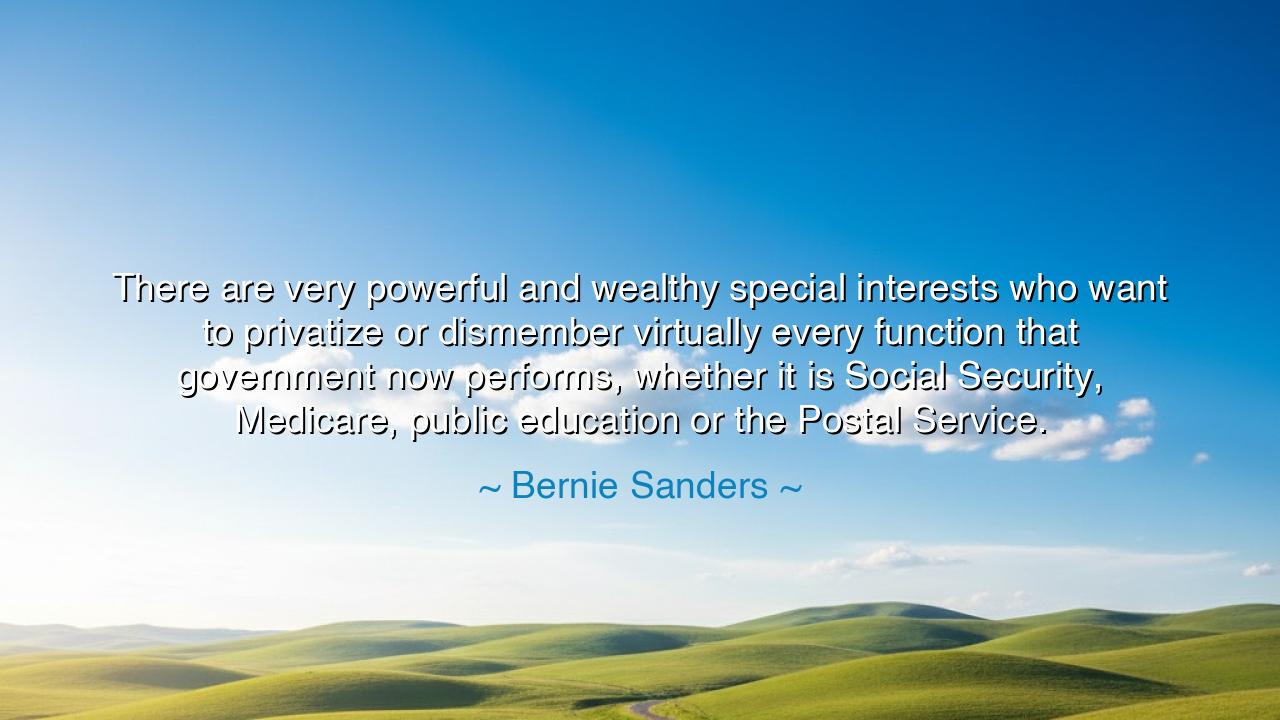
There are very powerful and wealthy special interests who want to
There are very powerful and wealthy special interests who want to privatize or dismember virtually every function that government now performs, whether it is Social Security, Medicare, public education or the Postal Service.






"There are very powerful and wealthy special interests who want to privatize or dismember virtually every function that government now performs, whether it is Social Security, Medicare, public education or the Postal Service." – Bernie Sanders
In these words, Bernie Sanders speaks as a prophet of democracy, warning of a silent war waged not with weapons but with influence, greed, and gold. His message is not merely about economics, but about the soul of public life—that sacred trust between the people and the institutions built to serve them. When he names Social Security, Medicare, public education, and the Postal Service, he invokes not programs, but pillars of social solidarity, the living proof that a society can care for its weakest, teach its children, and connect its people without profit as its god. To privatize these is to turn compassion into commodity, to sell the heart of the nation piece by piece to the highest bidder.
This quote arises from Sanders’ long crusade against corporate influence in American governance, a struggle rooted in the populist traditions of Roosevelt and the labor movements that fought for the rights of workers, the elderly, and the poor. He warns of "powerful and wealthy special interests"—those unseen hands that seek to bend the public good into private gain. History echoes with such struggles: in the Gilded Age, when railroads, oil barons, and financiers sought to control not just markets but governments; in the Reagan era, when deregulation and privatization were sold as freedom but left many shackled to debt and despair. Sanders stands in that lineage of resistance—calling the people to awaken before the common good is carved into profit margins.
Consider the tale of Britain’s railways, once public, later privatized. They were promised as more efficient, more modern, more responsive to competition. Yet in time, prices rose, service declined, and maintenance failed, leading to chaos and tragedy. What was once built for the people became a tool for profit. This story, repeated in different forms across nations, reveals the eternal truth that some things—health, education, safety, dignity—cannot be left to the market, for their true worth cannot be measured in currency.
Sanders’ words ring especially in the ears of those who remember the Great Depression, when unregulated greed brought nations to their knees, and the people turned to the state for rescue—not as a master, but as a guardian. From those ashes rose Social Security, to protect the elderly from destitution; Medicare, to heal the sick; public schools, to enlighten the young; the Postal Service, to bind the vast land together. Each of these was born not from profit but from compassion institutionalized, the belief that a nation’s greatness lies in how it serves its people, not how much it extracts from them.
To "dismember government" is to dismantle the covenant that binds the citizen and the state. It is to turn society into a battlefield of self-interest, where every service is sold, every care charged, and every child’s chance depends on wealth. The ancients taught that when rulers grow greedy, the polis decays; when public virtue is forgotten, tyranny or chaos follows. So too today, the erosion of the public sphere is not a political shift—it is a moral collapse.
The lesson of this quote is clear and eternal: guard the public good as you would your own hearth. Do not be lulled by promises of efficiency or wealth if they come at the cost of humanity. The things that bind us—our schools, hospitals, mail, and shared safety nets—are not burdens but blessings. They are proof that we believe in one another.
And so, the practical call to each of us is this: stay vigilant, speak out, and participate. Vote not just for yourself, but for the generations to come. Question those who would profit from your rights. Support leaders who see governance not as a business, but as a sacred duty. For when the people grow silent, the merchants of power grow bold—and what they purchase, if left unchecked, is the very heart of the Republic.






AAdministratorAdministrator
Welcome, honored guests. Please leave a comment, we will respond soon